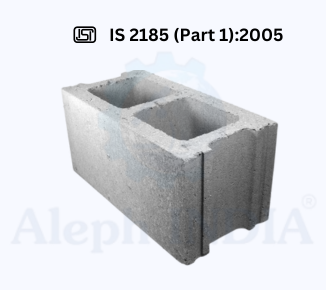BIS CERTIFICATION FOR Concrete Masonry Units - Hollow and Solid Concrete Blocks as per IS 2185 (Part 1)
Published Date: September 21, 2024
Introduction
Concrete masonry units made both as hollow blocks and solid concrete blocks, are a product line that is vital for the building construction process. These items, governed by IS 2185 (Part 1): 2005, cater to a wide range of applications in buildings, providing both reliability and versatility. In this respect, the standard specifies the specifications for the design and performance of concrete blocks to ensure compliance with the related quality, strength, and durability criteria. Concrete masonry units are some of the most frequently used building materials in residential as well as commercial construction.
Here, they can be hollow blocks-confining it to use just in walls and partitions-and solid blocks-the ones that work as structural supports and insulators. These products are integral parts of the construction industry, being strong, fire-resistant, and relatively easy to handle. BIS or Bureau of Indian Standards certification is important in making sure that concrete masonry units meet and comply with the requirements and standards specified by Indian regulations. It just gives assurance to the consumer and to the builder of the products that they pass through a series of tests and meet the set performance parameters defined. It also helps in adherence to the requirements of the Indian market and import regulations. The market for concrete masonry units is very robust and picking up, with an increasing construction sector coupled with infrastructure development primarily. The increasing requirement for renewable, viable building materials boosts the market strength of concrete blocks, which in itself is preferred for most construction projects.
- Hollow Blocks: Used for partition walls, boundary walls, and as infill in larger structures.
- Solid Blocks: Ideal for load-bearing walls, foundations, and structural supports.
- Versatility: Suitable for various applications, including residential buildings, commercial complexes, and infrastructure projects.
Overview of IS 2185 (Part 1)
Indian Standard, IS: 2185(Part 1): 2005, specifies requirements for concrete masonry units, hollow and solid concrete blocks. In simpler terms, it states the requirements for the delivery of the concrete and its quality in terms of strength and duration. In other words, the concrete performs with particular parameters and fulfills the criteria required in designing; it covers various areas, such as physical properties and dimensions along with different testing methods so that the concrete blocks will meet the required standards at the construction site. This specification mandates that a manufacturer who is desirous of obtaining BIS certification shall comply with IS 2185 (Part 1): 2005. It is an essential requirement for market acceptance and regulatory compliance in India. The standard essentially means that construction projects shall have structural adequacy as well as safety of structures-with this factor having an impact on the total quality of the built environment.
Key Aspects of IS 6072
- Material Specifications: Defines the quality and characteristics of raw materials used in the production of concrete blocks.
- Performance Requirements: Outlines the physical and mechanical properties, such as compressive strength and water absorption, necessary for functional use.
- Safety Needs: Ensures products meet safety standards to minimize hazards in construction and usage.
- Testing and Compliance: Specifies testing methods for verifying compliance with the standards and performance criteria.
Key highlights
| Product Name | Concrete Masonry Units (Hollow and Solid Concrete Blocks) |
| Applicable Indian Standard | IS 2185 (Part 1): 2005 |
| Applicable Certification Scheme | BIS Certification |
| Applicable Mark: | BIS Logo |
| Compliance Requirement | Mandatory |
| Quality Control Order | Click here |
| Ministry | Ministry of Commerce and Industry |
| Scope as per Standard | This standard (Part 1) addresses concrete masonry building units utilized in constructing load-bearing and partition walls, specifically focusing on hollow (both open and closed cavity) load-bearing and non-load-bearing concrete blocks, as well as solid load-bearing and non-load-bearing concrete blocks. |
| Major Country of Import | India |
Applicable Tests for Concrete Masonry Units - Hollow and Solid Concrete Blocks IS 2185 (Part 1)
- Surface texture and finish
- General
- Dimensions
- Block density
- Compressive Strength
- Water absorption

Note
For Detailed Information about the Procedure for BIS ISI Certification, Visit :
Timeline for BIS Certification
The approximate timeline to obtain BIS certification for Concrete-Based Building Products (Concrete Masonry Units - Hollow and Solid Concrete Blocks) to use the ISI mark as per IS 2185 (Part 1): 2005 is as follows:
- For Indian Manufacturers (Standard Timeframe – 30 days)
- For Foreign Manufacturers (Standard Timeframe – 180 days)
Benefits of BIS Certification
Obtaining BIS certification offers several advantages:
| Benefit | Description |
|---|---|
| Access to the Indian Market | Certification opens up access to the Indian market, which has stringent regulatory requirements. |
| Compliance with Indian Standards | Ensures that products meet the specific standards required for safety and performance in India. |
| Enhanced Product Credibility | Certified products are recognized for their quality, boosting credibility with clients and partners. |
| Increased Customer Trust | Customers are more likely to trust and choose products that carry BIS certification. |
| Benefits for MSMEs | Helps micro, small, and medium enterprises (MSMEs) compete effectively in the market by demonstrating adherence to quality standards. |
Case Study
For instance, in a recent infrastructure project, a significant construction company selected BIS-certified concrete masonry units for its high-rise development. The associated certificate ensured that the blocks met strict quality parameters, which are part of the development's safety and durability. According to the company, developing the project with those blocks made the approval process easier and led to higher levels of client satisfaction because of compliance with IS 2185 (Part 1): 2005.
Conclusion
Not only does BIS certification of concrete masonry units identify acceptance of Indian standards, but it promotes much convenience in terms of market access and product credibility. Indeed, implementation of IS 2185 (Part 1): 2005 assures quality and ensures rules and regulations to be followed. ALEPH INDIA played a very important role in providing consultancy to manufacturers who wish to attain BIS certification. They are equipped with a specific body of knowledge and a streamlined process so that certification needs can be approached sequentially, thereby ensuring quality improvement with frictionless entry into the market.
For more updates and detailed procedures, stay connected with Aleph INDIA and ensure your products are always compliant and top-quality.
Frequently Asked Questions
International Audits & Participation
Testimonials
BIS REGISTRATION FOR ELECTRONIC & IT PRODUCT
In the era of globalization, world trade is growing rapidly and henceforth, Manufacturing and Import/Export businesses are also growing drastically...View More
BIS CERTIFICATE FOR FOREIGN MANUFACTURER
The Economy of India-the fastest developing economy on the globe with the capabilities that help it matches up with the biggest international...View More
PRODUCT CERTIFICATION SCHEME (ISI MARK) FOR DOMESTIC MANUFACTURERS
Anything a person buys from food to cars, clothes to electronics, branded to unnamed products there is always a question that wanders in one’s...View More
WIRELESS PLANNING AND COORDINATION (WPC)
WPC: Wireless means communication done from one point to another point without the wires and cables. Electromagnetic waves carry the ...View More
BUREAU OF ENERGY EFFICIENCY (BEE) CERTIFICATE
BEE CERTIFICATE: Energy is the future, and its conservation is the way of the bright future. Everyone claims the environment is important...View More
E-WASTE MANAGEMENT
E-waste is one of the world's fastest-growing trash streams. We currently manufacture almost 50 million tones of it each year...View More
View All Services
Request a call back.
Would you like to speak to one of our Senior Technical advisers over the phone? Just submit your details and we’ll be in touch shortly. You can also email us if you would prefer.






























